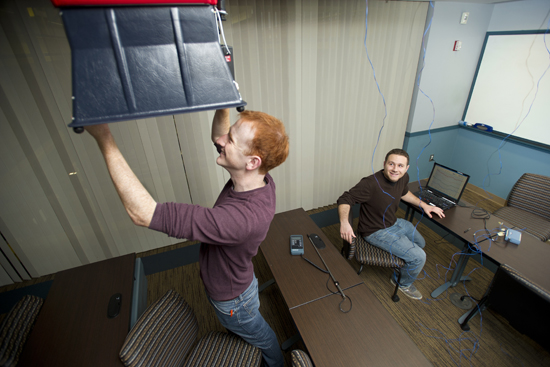BU Team Takes a First at MIT Clean Energy Competition
Software would optimize HVAC in commercial buildings

Team Aeolus Building Efficiency: ENG Associate Professor Michael Gevelber (from left), David Cushman (GSM’14), Jonathan Ellermann (GSM’13), Ryan Cruz (ENG’13), and Benjamin Smith (GSM’13), with the $20,000 Energy Efficiency Track Prize. Photo by Sanna McDaniel
A new technology that could be a game-changer for energy use in today’s commercial buildings, the result of a collaboration between two BU schools, took first prize in the energy efficiency category of the annual MIT Clean Energy Prize in May. The plan uses software, and no additional mechanical equipment, to reduce energy usage in commercial buildings by up to 20 percent.
Comprising students and faculty from the College of Engineering and the School of Management, the team, Aeolus Building Efficiency, won $20,000 for its business plan for a full-service company that uses software to optimize airflow and reduce energy consumption in large office heating, ventilation, and air conditioning (HVAC) systems. Commercial buildings account for 18 percent of greenhouse gas emissions and 36 percent of national electric demand.
“What’s amazing about our approach is that the system would take the same time to work on a building the size of Sargent College as it would for the Prudential Center,” explains team member Michael Gevelber, an ENG associate professor of mechanical engineering.
The team, Ryan Cruz (ENG’13), David Cushman (GSM’14), Jonathan Ellermann (GSM’13), Benjamin Smith (GSM’13), Donald Wroblewski, a former ENG professor of mechanical engineering, and Gevelber, outperformed 15 other teams from 9 states, among them competitors from Harvard University, MIT, and the University of Chicago.
Aeolus drew on ENG members’ expertise in building energy efficiency and HVAC systems optimization, and SMG members’ business development, operations, project management, and sustainability experience. Their presentation impressed a panel of six judges from academia, government, and industry, who based their assessments on environmental benefit, creativity, execution and financial strategy, market and customer knowledge, and team strength.

Smith says he relished the opportunity to compete against outstanding teams and technologies from some of the nation’s top academic institutions. “Not only were we able to develop a comprehensive and compelling business plan, but the competition gave us an opportunity to substantiate that plan with clean tech industry leaders,” he says. “It was an amazing experience.”
“It was a great learning experience for all the team members, and we’re proud to get BU’s name recognized at such a highly competitive event,” Gevelber says. “We also had great mentoring from other BU faculty in both schools, and received support from BU’s Office of Technology Development, Institute for Technology, Entrepreneurship, and Commercialization (ITEC), and Sustainable Neighborhood Lab.”
Based on concepts developed by Paul Gallagher (ENG’13) in his master’s thesis, Aeolus aims to commercialize its software-based service, which enables room-by-room measurement and optimization of airflow rates, thereby reducing energy consumption while maintaining thermal comfort and meeting ventilation requirements.
The system, which is being patented by BU, was invented by Gevelber, Wroblewski, and Gallagher. It uses computer-based building automation systems to reduce large building HVAC energy consumption by up to 20 percent without equipment installation, intensive manual labor, or long payback periods.
The MIT Clean Energy competition, one of six premier US regional clean energy student business plan competitions, was started in 2007 and is sponsored by NSTAR and the US Department of Energy. It awards prizes in three categories—renewable energy, infrastructure and resources, and energy efficiency. The competition’s $20,000 Energy Efficiency Track Prize is sponsored by the Massachusetts Clean Energy Center.
Mark Dwortzan can be reached at dwortzan@bu.edu.
A version of this article was originally published on the Center for Information & Systems Engineering website.
Comments & Discussion
Boston University moderates comments to facilitate an informed, substantive, civil conversation. Abusive, profane, self-promotional, misleading, incoherent or off-topic comments will be rejected. Moderators are staffed during regular business hours (EST) and can only accept comments written in English. Statistics or facts must include a citation or a link to the citation.